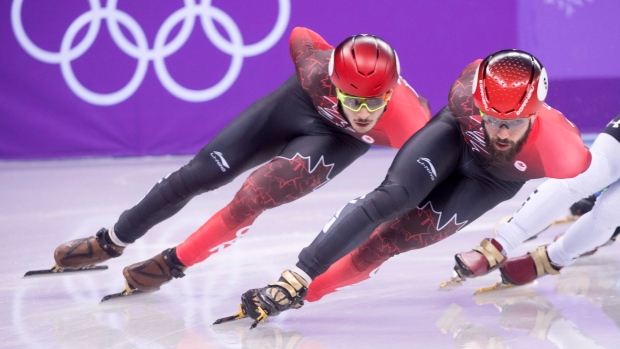Feb 10, 2018
Hamelin, Girard miss out on short track medals
Charles Hamelin's last Olympic Games has started with disappointment. Hamelin was disqualified in the final of the men's 1,500-metre short track speedskating event, dashing one of Canada's early medal hopes at the Pyeongchang Olympics.
The Canadian Press

GANGNEUNG, Korea, Republic Of — Charles Hamelin's last Olympic Games has started with disappointment.
Hamelin was disqualified in the final of the men's 1,500-metre short track speedskating event, dashing one of Canada's early medal hopes at the Pyeongchang Olympics.
Hamelin, from Sainte-Julie, Que., was the defending Olympic champion in the distance. Teammate Samuel Girard of Ferland-et-Boilleau, Que., just missed the podium in fourth place.
Lim Hyojun of South Korea won gold in Saturday's race, giving South Korea its first gold medal of the Games. He raised his arms in triumph and let out a yell as the capacity crowd roared its approval.
Sjinkie Knegt of the Netherlands took and Semen Elistratov of the Olympic Athletes from Russia captured bronze.
"When you look at the individual distances on the men's side, there is not a lot of back-to-back medals," Hamelin said. "It shows how much short track speed skating changes in four years.
"If there is one thing I can be proud of is that I reached the final of the 1500 meters for a third time in four games. That is what I will take away from today, but of course I would have preferred a better result."
Kim Ki-Hoon is the only male short-track speedskater to defend an Olympic title, winning the 1,000 metres in 1992 and 1994.
Hamelin needs one more medal to join Marc Gagnon and Francois-Louis Tremblay as Canada's most decorated Olympic short-track speedskaters. He has two medals to join Cindy Klassen and Clara Hughes as the most decorated Canadian athletes in Olympic history.
He will next compete Tuesday in qualifying for the men's 1,000 metres.
"I tried to protect my third place behind the two Koreans, but two skaters tried to overtake me on both side and I got stuck in the middle," Hamelin said. "I touched someone and lost my balance and ended up at the back of the pack. With six laps left and six skaters to pass to reach the podium, it was not going to be easy."
Hamelin showed struggles before the final, advancing to the final field by the edge of his skates.
He finished second in his semifinal, just .002 seconds ahead of South Korea's Yira Seo.
Girard fell in the semifinal after making contact with American J.R. Celski, but moved on when Celski was assessed a penalty and disqualified.
He held his own in a chaotic final to claim fourth.
"It is an amazing feeling to skate on the ice. The atmosphere, to be here at the Olympic games, everything is 10 times bigger," Girard said. "It is incredible and I am happy to have lived that.
"People often remember the medal, but I will remember the experience. I am really proud of what I accomplished."
Lim surged past Knegt and finished about two blade lengths ahead in an Olympic-record of 2 minutes, 10.485 seconds.
Knegt earned silver while bronze went to Semen Elistratov, who became the first Russian medallist of the games.
Russia was banned from the Olympics for a massive doping scheme four years ago in Sochi, but Elistratov is among 168 competitors allowed in as "Olympic Athletes from Russia."
Lim beat out eight rivals in the final, which had three extra skaters after some were advanced because of penalties in the semifinals. Knegt patted Lim on his helmet after the two crossed the finish line.
U.S. Vice-President Mike Pence and his wife watched the competition at Gangneung Ice Arena with South Korean President Moon Jae-in and his wife, although they left before Lim's victory.
Lim wasn't even the strongest South Korean skater in the final. Hwang Dae-heon led the World Cup rankings after having won most of his 1,500 races this season, but he crashed. The other South Korean, Seo Yira, was relegated to the B final.
Elistratov is on a much diminished Russian short-track team, after several skaters were refused invitations by the International Olympic Committee, which said it couldn't be confident they weren't involved in doping.
The IOC invited only three Russian men's skaters, meaning Elistratov can't compete in the 5,000-meter relay. He was on the four-man team that won that event at home four years ago in Sochi.
Elistratov has said he sought advice from his wife, parents and coach before deciding to accept the IOC's invitation to go to Pyeongchang. He was cleared of a doping offence in 2016 after he tested positive for the banned substance meldonium.
Elistratov was forced to miss that year's world championships before his suspension was lifted when the World Anti-Doping Agency issued an amnesty for athletes with low concentrations of the Latvian-made heart drug.
Meldonium had been banned in January 2016, two months before Elistratov's failed test, and WADA admitted it wasn't sure how long the drug could stay in the body, even if athletes had stopped taking it before it was prohibited.
Russian tennis star Maria Sharapova served a 15-month suspension, though, because she had taken meldonium after it was banned.
___
CP Sports reporter Alexis Belanger-Champagne and AP Sports Writer James Ellingworth contributed to this report.
